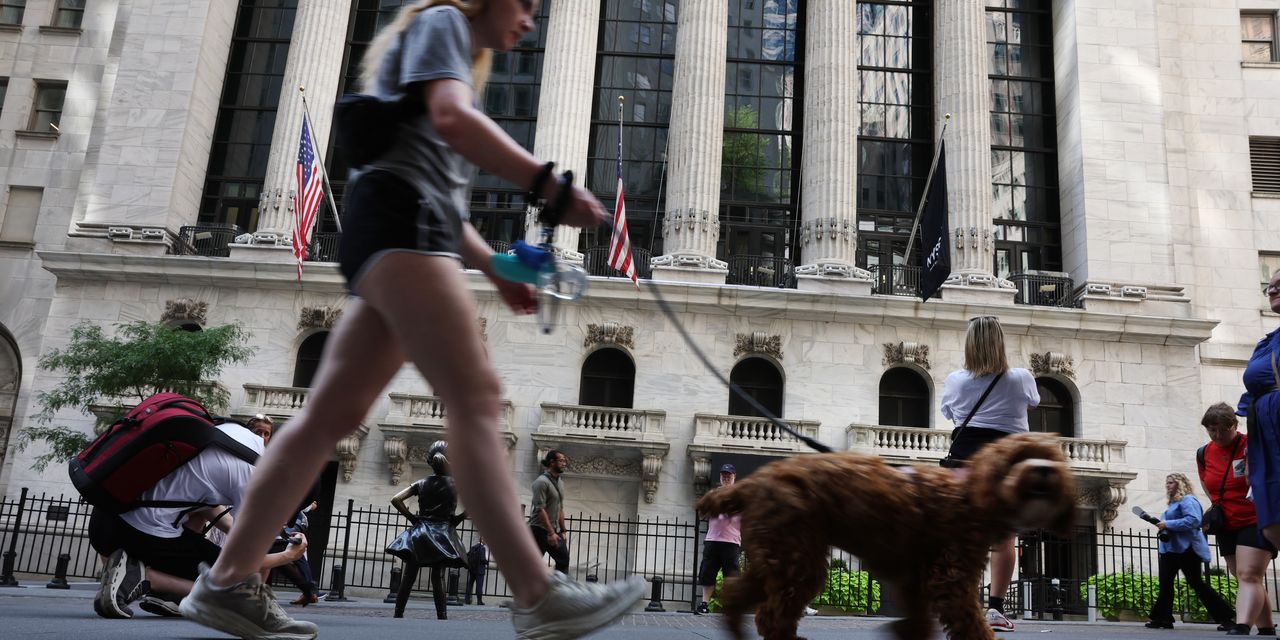U.S. stocks closed lower Tuesday, but off the session’s worst levels, as oil prices and bond yields rose ahead of the Federal Reserve’s interest rate decision Wednesday.
How stocks traded
-
The S&P 500
SPX
closed down 9.58 points or 0.2%, at 4,443.95 -
The Dow Jones Industrial Average
DJIA
ends down 106.57 points or 0.3% at 34,517.73 -
The Nasdaq Composite
COMP
finished 32.05 points or 0.23% lower at 13,678.19
On Monday, the Dow Jones Industrial Average
DJIA
rose 6 points, or 0.02%, to 34624, the S&P 500
SPX
increased 3 points, or 0.07%, to 4454, and the Nasdaq Composite
COMP
gained 2 points, or 0.01%, to 13710.
What drove markets
Investors will be watching the interest rates policies from the Federal Reserve, Bank of England and Bank of Japan this week.
The U.S. central bank is widely expected by the market to leave its policy interest rates at a range of 5.25% to 5.50% after its meeting on Wednesday. The trouble is guessing what comes next.
Traders are wary about accompanying guidance on any future rate rises amid stubborn inflationary pressures, a concern that sees 10-year benchmark Treasury yields
BX:TMUBMUSD10Y
holding near their highest level since 2007.
Markets “are looking for certainty and the Fed doesn’t want to give it to them,” Eugenio Alemán, Raymond James chief economist, said in a phone interview.
Raymond James is expecting one more rate hike in 2023 and the first rate cut to occur in 2024’s third quarter, Alemán noted. Inflation threats remain, most of all with the price of oil. Oil and gas prices are some of the most important determinants of consumer inflation expectations, Alemán noted.
It’s possible that oil gets back to $100 a barrel, Chevron CEO Mike Wirth predicted Monday. West Texas Intermediate crude for October delivery
CL.1,
CLV23,
rose to $91.6 a barrel on Tuesday. Gas prices averaged $3.88, up from $3.67 a year ago, according to AAA.
See also: Could rising oil prices tip the U.S. into a recession?
At Vanguard, Chief Global Economist Joe Davis said a “soft landing is still possible, but not probable in our view, as it would require an unlikely ‘painless disinflation process,’ toward target without a slowing of demand in the economy.” Davis is expecting another Fed pause on Wednesday but it make take up to three more interest rate hikes before the Fed is truly done tightening, he said.
Read also: 4 things to watch for at this week’s Fed monetary-policy meeting
In another look at economic conditions Tuesday morning, U.S. housing starts fell 11.3% in August after a revised 2% gain in July. Starts dropped to their lowest level since June 2020, with demand crimped by mortgage rates over 7%.
Companies in focus
-
Maplebear Inc., which is doing business as Instacart
CART,
+12.33% ,
debuted on Wall Street with a bang Tuesday, as the grocery-delivery app’s stock opened 40% above where its initial public offering priced. The company said late Monday that its IPO of 22 million shares priced at $30 a share, which was at the top of the expected range. The first trade was at $42.00 at 12:49 p.m. Eastern for 2.59 million shares. At that price, the company would be valued at $14.2 billion, based on 338.8 million as-converted, fully diluted shares outstanding after the IPO. Its shares closed up 12.3% Tuesday.
-
Nio Inc.
NIO,
-17.07%
shares were down 17% after the Chinese electric vehicle maker announced a convertible bond offering. Half of the $1 billion debt offering will come due in 2029 and the other half in 2030. Money from the bonds is intended buy back a portion other debt securities, while also strengthening the balance sheet. -
Block Inc.
SQ,
-2.83%
shares are off 2.8% after an announcement reshuffling leadership. Alyssa Henry, who lead’s Block’s Square merchant business is stepping down, according to a company filing. Jack Dorsey, Block’s co-founder and CEO — as well as Twitter’s co-founder and onetime CEO — is adding the position to his duties. -
Carnival Corp.
CCL,
+0.33%
shares edged up after an stock upgrade from analyst who has been bearish on the cruise operator. Strong booking trends and signs of strength in the cruise market were reason for Truist analyst Patrick Scholes’ upgrade.
— Jamie Chisholm contributed.
Read the full article here




